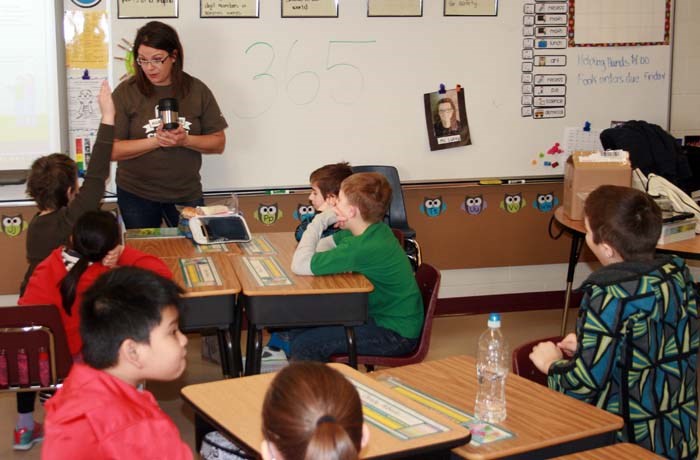There are few initiatives in agriculture which make more sense than Agriculture in the Classroom.
An initiative Canada wide here in Saskatchewan it provides innovative, curriculum-based programs and resources to help increase students’ awareness and understanding of agriculture.
What that really means is students are taught that agriculture matters.
With the recent Agriculture Literacy Week in Saskatchewan (March 1-7), I was afforded an opportunity to see the efforts of Ag in the Classroom first hand.
Grade 4 students at Columbia School in Yorkton were among students in 161 classrooms to take part in the launch of a new school resource with presenters reading ‘The Adventures of Michael & Mia: Stewards of the Land’ a new book geared toward teaching students more about where their food comes from
The book, by author Edward Willet and illustrated by Val Lawton, touched on some technical aspects of agriculture, from the use of global positioning systems for precision farming, to how a riparian area protects natural water ways.
When Michael and Mia accidentally cause a run-off of fertilizer dad is quick to point out; “Fortunately,” Dad said, “the farmer who owned this land before us maintained these bushes along the creek and let native grasses grow between the garden and the creek bed too. That will have trapped most of the fertilizer and prevented it from getting into the water. It’s called ‘riparian management’ and it’s something I’m working really hard to keep doing well.”
And in another spot mom asks; “GPS units,” Mom said. “Do you know what GPS stands for?” “Global Positioning System,” Mia said proudly. “We learned that in school.” Mom smiled. “Very good! Using GPS and other technology, we’re doing what’s called ‘precision farming.’ That’s where you break your fields down into smaller zones and manage each one a little differently. It helps us conserve fuel, ensures we put just the right amount of nutrients and crop protection products in just the right places, and it’s good for the environment. It will also leave the land in better shape for whoever farms it after us.”
It might sound a bit more technical than Grade 4, but most times as adults we underestimate the ability of children to understand and grasp new ideas.
In this case the book even references the idea of using Google to learn things, something young students know better than old writers like myself.
In a release on Agriculture Literacy Week, Ag in the Classroom AITC Executive Director Sara Shymko hit the nail rather surely in terms of the importance of the initiative.
“Agriculture plays a vital role in our lives, and it’s important that our youth understand that,” she said in a prepared release. “Students often learn best when they are able to connect with their subject matter. By introducing them to people directly involved in the agriculture industry, we’re able to help them understand the role agriculture plays in their lives and in the world.”
And that was what was so compelling in Joelle Carlson’s reading of the book to Columbia School students.
“We eat every day,” said the agrologist from Melville, SK.
Carlson pointed to a large 365 she had placed on the chalkboard, and told the students we eat every day of the year “because we need food to fuel our bodies.”
Carlson then asked, “Every day we eat what should we think about?”
The answer was farmers.
Referring to the book, and how it ties into food production, Carlson said, “see how everybody is connect to agriculture in this room,” although not one student lived on a farm.
“So 365 days-a-year, lets thank the farmers,” she said.
That is something we all should do, whether it is the canola producer thanking beef farmers for their steak, or vice versa for cooking oil.
And certainly for those of us who do not toil directly on the farm, our grocery carts would be empty without agricultural producers.
While it is important an organization such as Agriculture in the Classroom start the education process with young students, it is something we all need to remember. Supporting farmers in their efforts to produce food and earn a reasonable living means we all end up with food to eat 365.
Calvin Daniels is Assistant Editor with Yorkton This


.JPG;w=120;h=80;mode=crop)

